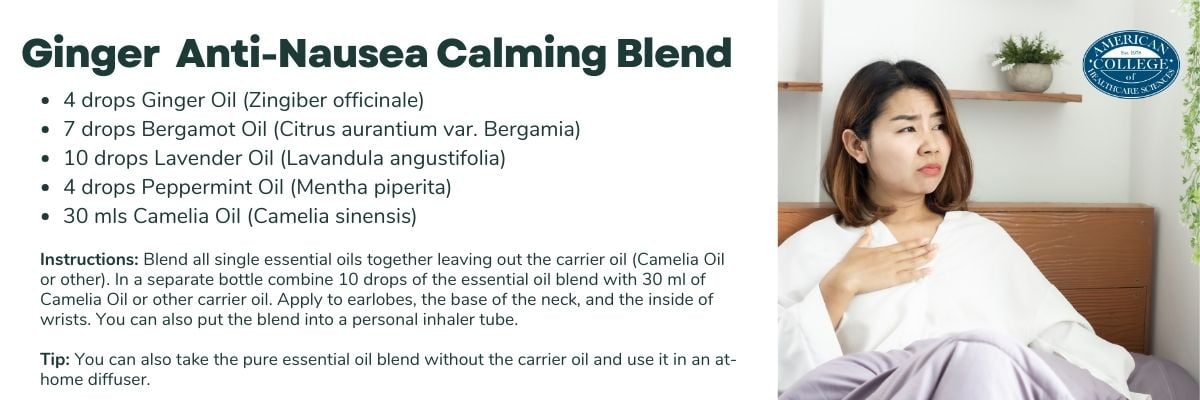Written by Dorene Petersen, Founding President of American College of Healthcare Sciences, ACHS.edu. Based on Dorene's article, Generous Ginger Essential Oil, first published in the International Herb Association Ginger Herb of the Year™ 2023. Reprinted with permission.
In the ACHS blog, Ginger: A Closer Look, Founding President Dorene Petersen explored the history of Ginger Oil Zingiber officinale Roscoe and an introduction to its therapeutic uses in aromatherapy. Dorene's article, How to Use Ginger Oil, delved deeper into methods of administration for this versatile essential oil.
Another area of research for Ginger Oil Zingiber officinale is its potential to support chemotherapy-induced nausea. Several recent clinical trials have evaluated the efficacy of inhaled ginger essential oil to reduce decreased appetite, anxiety, fatigue, and nausea during chemotherapy, specifically for neuroendocrine, skin, and gastrointestinal cancer.1 2 One of these studies compared ginger, German chamomile Matricaria recutita (L.), and bergamot Citrus aurantium (L.) var. bergamia, essential oils versus an odorless control oil on appetite, anxiety, fatigue, and nausea. The results showed ginger essential oil produced statistically significant results for anxiety and fatigue.3 Furthermore, a systematic literature review suggested ginger may reduce nausea during chemotherapy in patients with breast cancer.
A total of nine clinical trials were included, which were published between 2012 and 2017.4 The method of administration of ginger varied among trials and included delivery of two drops of ginger essential oil delivered via an aroma necklace, other studies gave capsules of 0.25 or 0.5 grams of dried ginger root or dried powdered ginger root containing specific constituent profiles, while another study administered 500 mg of powdered ginger twice daily, mixed with a spoonful of yogurt to make swallowing easier. The duration ranged from 3 to 10 days, and ginger was given five days before to 30 minutes after the beginning of chemotherapy.5 One study speculated that initiating the ginger treatment protocol before chemotherapy starts resulted in a more significant reduction of chemotherapy-induced nausea.6 However, further studies are needed to verify this claim.
A double-blind placebo trial in 2018 evaluating ginger essential oil in relieving chemotherapy-induced nausea in 21 children with cancer resulted in a 67% improvement. However, the researchers concluded while ginger essential oil was well received, well tolerated, nontoxic, and noninvasive, it did not significantly decrease nausea in patients enrolled in this study.7
However, for anyone embarking on chemotherapy, it seems that starting treatment with ginger five days before chemotherapy begins may elicit better results. For anyone who cannot tolerate the taste or aroma of ginger, transdermal patches are another potential delivery method. Massage is another viable alternative. Researchers in a single-blind randomized-controlled trial demonstrated improved cellular immunity for patients receiving chemotherapy for bowel cancer who received three Thai massage sessions using ginger essential oil and coconut oil over one week. Lymphocyte numbers were boosted by 11%. As an added benefit, fatigue, pain, and stress were all reduced in the group receiving ginger essential oil massage compared to the control group.8 Nausea was not mentioned in this study, however reduced stress and anxiety typically results in reduced nausea. Overall, the results of these studies showed all forms of ginger, not just the essential oil, and all administration methods resulted in positive outcomes.

Ginger Anti-Nausea Calming Blend
- 4 drops Ginger Oil Zingiber officinale
- 7 drops Bergamot Oil Citrus aurantium var. Bergamia
- 10 drops Lavender Oil Lavandula angustifolia
- 4 drops Peppermint Oil Mentha piperita
- 30 mls Camelia Oil Camelia sinensis9
Instructions: Blend all single essential oils together, leaving out the carrier oil (Camelia Oil or other). In a separate bottle, combine 10 drops of the essential oil blend with 30 ml of Camelia Oil or other carrier oil. Apply to earlobes, the base of the neck, and the inside of wrists. You can also put the blend into a personal inhaler tube.
Tip: You can also use the pure essential oil blend without the carrier oil in an at-home diffuser.
Safety Guidelines Regarding the Use of Ginger Oil
Ginger’s toxic rating is I.10
A skin patch test is recommended for anyone with sensitive skin as it may cause irritation. This usually occurs when applied at full strength, which is not recommended. There have been reports of insignificant potential photosensitivity; however, for anyone with sun sensitivity, exercise caution.
- Do not apply full strength to the face, eyes, or nose.
- Avoid diffusion for longer than 15 minutes in a well-ventilated room for children under 10 years of age.
- Ginger essential oil, oleoresin, or CO2 extract should not be used while experiencing morning sickness or during pregnancy.
Sources:
1 Toniolo, J., Delaide, V., & Beloni, P. (2021). Effectiveness of inhaled aromatherapy on chemotherapy-induced nausea and vomiting: A systematic review. The Journal of Alternative and Complementary Medicine, 27(12), 1ute058–1069. Retrieved September 2, 2022, from https://doi.org/10.1089/acm.2021.0067
2 Williams, A. S., Dove, J., Krock, J. E., Strauss, C. M., Panda, S., Sinnott, L. T., & Rettig, A. E. (2022). Efficacy of Inhaled Essential Oil Use on Selected Symptoms Affecting Quality of Life in Patients With Cancer Receiving Infusion Therapies. Oncology nursing forum, 49(4), 349–358. Retrieved September 9, 2022, from https://doi.org/10.1188/22.ONF.349-358
3 Ibid.
4 Saneei Totmaj, A., Emamat, H., Jarrahi, F., & Zarrati, M. (2019). The effect of Ginger (Zingiber officinale on chemotherapy‐induced nausea and vomiting in breast cancer patients: A systematic literature review of Randomized Controlled Trials. Phytotherapy Research, 33(8), 1957–1965. Retrieved September 9, 2022, from https://doi.org/10.1002/ptr.6377
5 Ibid.
6 Ryan, J. L., Heckler, C. E., Roscoe, J. A., Dakhil, S. R., Kirshner, J., Flynn, P. J., Morrow, G. R.(2012). Ginger (Zingiber officinale) reduces acute chemotherapy‐induced nausea: A URCC CCOP study of 576 patients. Supportive Care in Cancer, 20(7),1479–1489. Retrieved September 9, 2022, from https://doi.org/ 10.1007/s00520‐011‐1236‐3
7 Evans, A., Malvar, J., Garretson, C., Pedroja Kolovos, E., & Baron Nelson, M. (2018). The Use of Aromatherapy to Reduce Chemotherapy-Induced Nausea in Children With Cancer: A Randomized, Double-Blind, Placebo-Controlled Trial. Journal of pediatric oncology nursing : official journal of the Association of Pediatric Oncology Nurses, 35(6), 392–398. Retrieved September 14, 2022, from https://doi.org/10.1177/1043454218782133
8 Khiewkhern, S., Promthet, S., Sukprasert, A., Eunhpinitpong, W., & Bradshaw, P. (2013). Effectiveness of aromatherapy with light thai massage for cellular immunity improvement in colorectal cancer patients receiving chemotherapy. Asian Pacific journal of cancer prevention : APJCP, 14(6), 3903–3907. Retrieved September 14, 2022 from, https://doi.org/10.7314/apjcp.2013.14.6.3903
9 Camelia oil is non-greasy and absorbs quickly but if you prefer you can substitute sweet almond or grapeseed.
10 ACHS.edu Toxic Rating: I = Low, II = Moderate, III = High (Low Therapeutic Margin)



